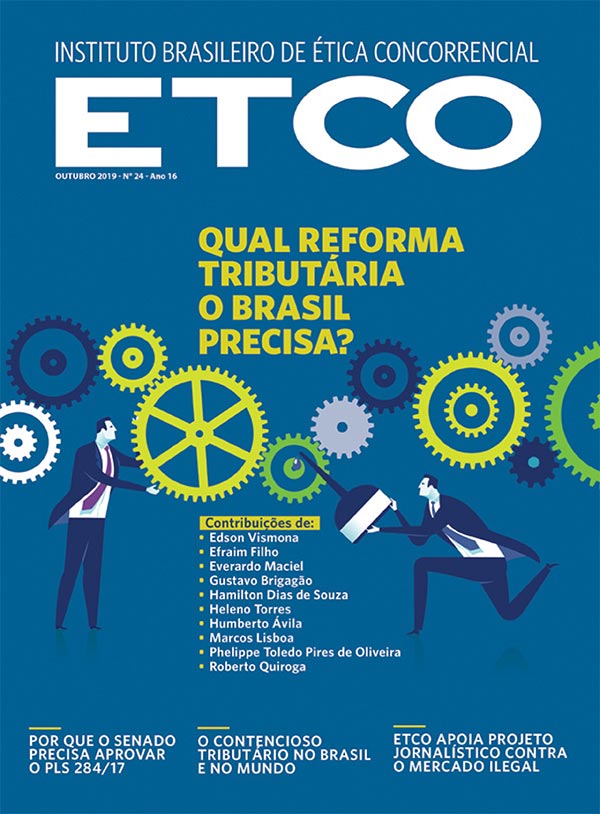"We need to simplify our tax system"
The assistant attorney general of the National Treasury, Phelippe Toledo Pires de Oliveira, points out issues that he would like to see addressed by the tax reform

The ideal tax reform must guarantee some assumptions: be economically sustainable; reassess the distribution of taxes between consumption, income and wealth; reduce the complexity and litigation level of the current system; respect the federative pact; review tax benefits; reform the tax collection process; and fight the stubborn tax debtor. These were the topics addressed by the Deputy Attorney General of the National Treasury, Phelippe Toledo Pires de Oliveira, at the Taxation in Brazil seminar, held in partnership by ETCO and the newspaper Valor Econômico. Following, a selection of excerpts from the lecture.
Optimal level of taxation
"Adequate taxation cannot be too low to not compromise the sustainability of the State in the provision of services, nor so high that it stifles the economy, kills the goose that lays the golden eggs."
Collection sources
“As taxable wealth, we traditionally have assets, income and consumption. From the Brazilian point of view, in income taxation, we have the IRPJ, the IRPF and the Social Contribution on Profit; on equity, IPTU, IPVA, ITBI and ITCMD; consumption, IPI, ICMS, PIS and Cofins. Today taxation in Brazil is based on consumption (48% of revenue) and payroll (26% of payroll and just under 20% of income tax). Taxation on equity in Brazil is less than 5%. ”
Why is it so complex
“Complexity is inherent in our tax system. It is complex because there are different tax types - taxes, fees, improvement contributions, compulsory loans - and within each of these species there are also the taxes themselves: Income Tax, Contribution for Intervention in the Economic Domain, contribution on the payroll . We have countless tributes. And countless taxes collected and imposed by different entities. So complexity is inherent in the system. ”
We need to simplify
“There are a multitude of taxation regimes, collection regimes, single-phase system, forward replacement, backward replacement, income tax withheld at source… So our legislation is a daily challenge. And complex legislation, combined with other economic factors, gives rise to enormous litigation. ”
High level of litigation
“We have about 6 million tax foreclosures within the Union alone. Today, in CARF alone, there are around 150 thousand cases in process and approximately 12 thousand to 14 thousand trials per year. Just to put an end to the tax liability today at CARF, considering that no more lawsuits would enter, it would take ten years. ”
“Legal discussions sometimes take twenty years. We need to try to reduce this dispute. A reformulation of the collection system is necessary. Tax enforcement is sometimes there for years, creating an incentive for the bad debtor. ”
Exemption from dividends
“The dividend exemption brought a great benefit, which was to end the discussion about the disguised distribution of profits. But it also spawned the phenomenon of ‘wronging’ to pay less taxes. ”
Reassess tax benefits
“The issue of tax benefits exists worldwide, but are the tax benefits here in Brazil fulfilling their purpose? To what extent would the reduction of these benefits not allow a consequent reduction in the corporate income tax rate? Just as we are seeing a discussion about the end of privileges for public servants and the end of privileges for deputies in relation to the social security benefit, it is necessary to rethink in relation to the tax, in relation to the return of this benefit to society. ”
Fight against the debtor
“Most of the time, they are companies that have nothing in their names. So the problem is timing in relation to the time of inspection and the time of collection, which the regular debtor will discuss administratively and judicially, postponing the payment until after ten years, when there will be no more equity. With this project to combat the persistent debtor [PLS 284/2017, pending in the Senate], in some very specific situations it is possible to cancel even the CNPJ registration, so that, immediately, it cannot continue to work. ”





